新概念英语第三册笔记第43课上课教案
新概念英语NCE3_lesson43-2课件
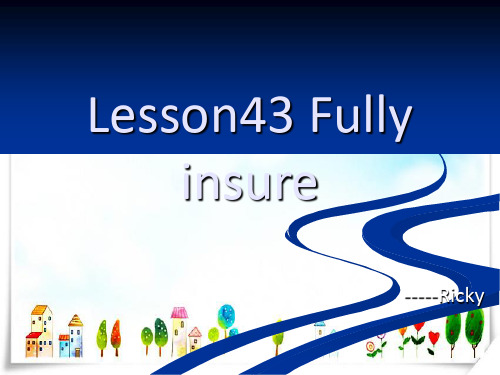
名词 n. [C]
1. 年刊,年鉴
(名1T鸟2Wo我39.h.en.)词 (e儿 们p鸟(wt高eb栖位ao待rn类itp位c.r息置c在h的dho[在较ef高Ctd)]o树高t高栖othk枝的he的息ei上r屋)处tpo休s。ao顶,rf栖息pa.上ed木处re观c;hf看高roo游处nm行aou。trrepeerbcrhanch.及1Lb小23名1.ir...物ta鸟词使tn把使河动lc儿飞eh.坐n鲈词e栖..落bs.落[i.歇置Cv,r于]t使d在于.s;暂树(使p较栖e枝处r高c上[于h或(。+[t较o(hn+e险)om]ns处)e]l)v[e(s+oonn)]the
(15)dive 不及物动词 vi. 1. 跳水[(+in/off/into/from)] He dived into the river to save a drowning child. 他跳入河中救一个快溺死的小孩。 2. 潜水[(+down/for)] The submarine dived. 潜水艇下潜了。 3. (飞机)俯冲 4. 急剧下降
He worked all summer to save money
1. 恢复健康;恢复原状;恢复[(+from)]for the purchase of a piano.
I think she will recover.
他工作了
2. 所购之物
(5)admittedly副词 ad.
不及物动词 vi.
不及物动词 vi.
1. 失去平衡
1. 发抖,打颤[(+with)]
名词 n.
As the temperature dropped abruptly, the
新概念第三册43课课件
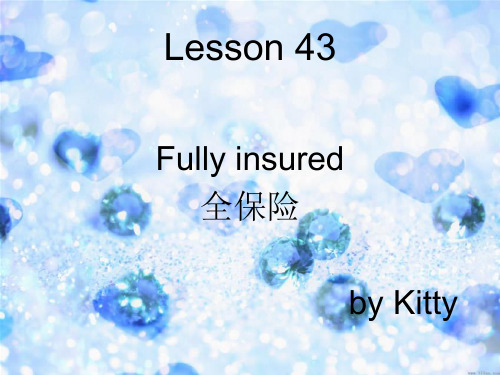
Fully insured 全保险 by Kitty
Review the words
• 略
Review the sentences
• 略
Fast reading
• Papers
Text
• Fully insured
• insure v. = make a contract that promises to pay a sum of money in case of accident, damage, loss, etc. insure sb./sth. against 给…上保险以 防… insurance n. insurance company 保险公司
Text
• Shivering in their wet clothes, the teenagers looked on while three men dived repeatedly into the water to locate the dish.
• shiver v. = tremble打颤,发抖 整体的颤抖用shiver, 部分的用tremble --His hands are trembling. --He is shivering with cold.
• haul v. = pull with effort our force 拖曳(强调用力去拉) --They hauled the boat up the beach.
Text
对比 1. pull 连续不断地拉 (应用范围最广泛) 2. drag 拖拉(两者之间有摩擦力) --The stone was so heavy that I had to drag it into the room. --After a day’s hard work, I dragged myself home. 工作了一天我拖着疲惫的身躯回了家
新概念英语3知识点梳理 Lesson 43 Fully insured全保险
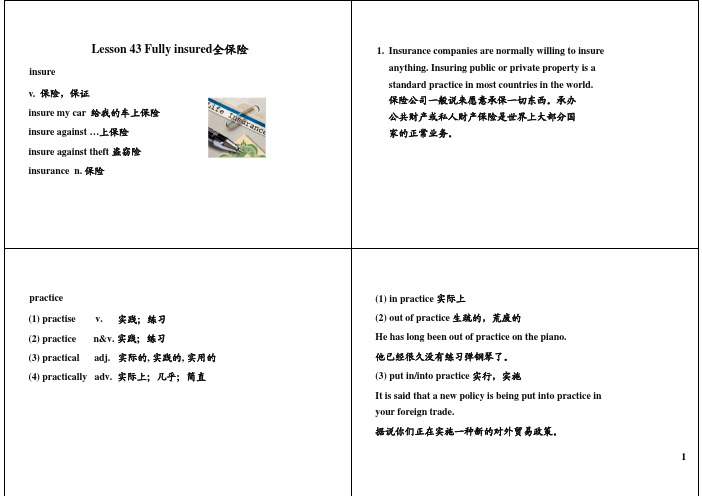
④ 倍数+ more+名词+ than B 例:He earns twice more money than he did five years ago.
⑤ 倍数 + as many/much+名词+ as B 例: He earns three as much money as he did five years ago.
Lesson 43 Fully insured全保险
insure v. 保险,保证 insure my car 给我的车上保险 insure against …上保险 insure against theft 盗窃险 insur1) practise (2) practice (3) practical
v. 实践;练习 n&v. 实践;练习 adj. 实际的, 实践的, 实用的
(4) practically adv. 实际上;几乎;简直
1. Insurance companies are normally willing to insure anything. Insuring public or private property is a standard practice in most countries in the world. 保险公司一般说来愿意承保一切东西。承办 公共财产或私人财产保险是世界上大部分国 家的正常业务。
写作技巧43:形容词的特殊用法 3. 否定词+比较级=最高级
I can't agree with you more. 我完全同意你。(再同意不过了) I can't be better today. 我今天感觉再好不过了。
4. the+比较级+of the two+名词 “两者中较……的一个” The taller of the two boys is my cousin. 两个男孩中个子高的那个是我表哥。
新概念英语第三册课堂笔记第43课:Fully insured
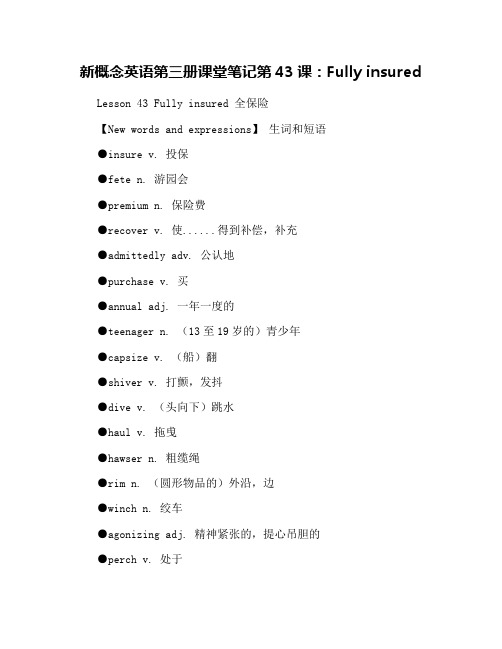
新概念英语第三册课堂笔记第43课:Fully insured Lesson 43 Fully insured 全保险【New words and expressions】生词和短语●insure v. 投保●fete n. 游园会●premium n. 保险费●recover v. 使......得到补偿,补充●admittedly adv. 公认地●purchase v. 买●annual adj. 一年一度的●teenager n. (13至19岁的)青少年●capsize v. (船)翻●shiver v. 打颤,发抖●dive v. (头向下)跳水●haul v. 拖曵●hawser n. 粗缆绳●rim n. (圆形物品的)外沿,边●winch n. 绞车●agonizing adj. 精神紧张的,提心吊胆的●perch v. 处于●precariously adv. 危险地,不稳固地●overbalance v. 失去平衡●cl amp n. 夹钳,夹板●vertically adv. 垂直地●torrent n. 激流,洪流●rebound v. 弹回◆insure v. 投保insure== make a contract that promises to pay a sum of money in case of accident, damage, loss, etc.insure sb/sth against 给…上保险以防…insurance n.insurance company 保险公司assure 向......保证,使确信,它的宾语一定是人。
I assure you that I’ll bring you Happiness. 我向你保证能给你带来幸福。
ensure v. 保证,确保宾语能够是物Hard work can ensure our success.guarantee 担保(指担保人的优秀品质,视之某物的质量I can guarantee the watch for ten months.L43-01 end 5’23”L43-02 begin 12’34”◆fete n. 游园会◆premium n. 保险费◆recover v. 使......得到补偿,补充recover vi 康复 recover fromrecover vt. ==make up for, compensate forEg: Nothing can recover our health.regain 经过努力而获得......regain one’s courage 重新获得勇气recover one’s courage 恢复勇气He regained / recovered his enthusiasm. 他又恢复了他的热情。
新概念第3册第43课Fully Insured PPT
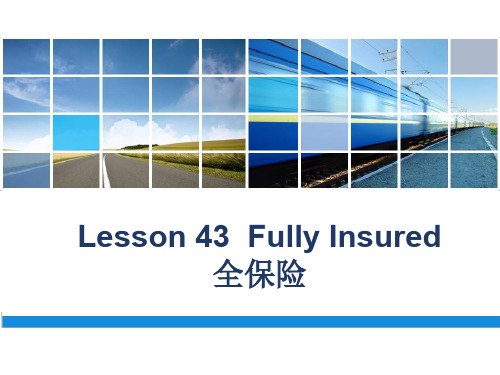
You are taking a great risk in trusting him.
In doing this job, you have to take a risk.
you will accumulate. The more you get, the better you feel. Needless to say, the more courses you take,
the more credits you will get.
It is not uncommon to hear that a shipping company has made a claim for the cost of salvaging a sunken ship.
If, however, you were holding an open air garden party or a fete, it would be equally possible to insure yourself in the event of bad weather.
in the event of=in case of
another line vertically.
torrent n.激流,洪流 rebound v 弹回 ---The ball is rebounded. The ball rebounded from/off the wall. Share prices rebounded today after last
新概念英语43课讲义
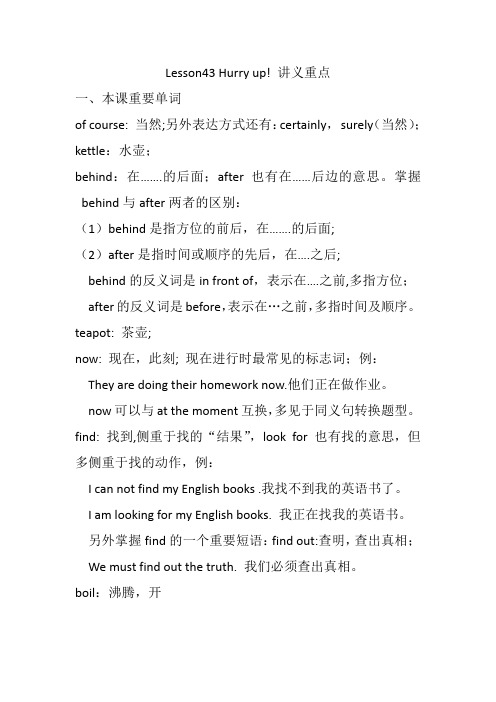
Lesson43 Hurry up!讲义重点一、本课重要单词of course: 当然;另外表达方式还有:certainly,surely(当然);kettle:水壶;behind:在…….的后面;after也有在……后边的意思。
掌握behind与after两者的区别:(1)behind是指方位的前后,在…….的后面;(2)after是指时间或顺序的先后,在….之后;behind的反义词是in front of,表示在….之前,多指方位;after的反义词是before,表示在…之前,多指时间及顺序。
teapot: 茶壶;now: 现在,此刻; 现在进行时最常见的标志词;例:They are doing their homework now.他们正在做作业。
now可以与at the moment互换,多见于同义句转换题型。
find: 找到,侧重于找的“结果”,look for 也有找的意思,但多侧重于找的动作,例:Ican not find my English books .我找不到我的英语书了。
I am looking for my English books. 我正在找我的英语书。
另外掌握find的一个重要短语:find out:查明,查出真相;We must find out the truth. 我们必须查出真相。
boil:沸腾,开二、本课重要知识点1. Is there any water in the kettle?水壶里还有水吗?在本句中需要掌握的重要知识点是there be句型和some和any的用法:(1)there is+可数名词的单数或不可数名词,例:There is a book on the table.桌子上有一本书。
There is some water in the bottle.瓶子里有一些水。
(2)there are+可数名词的复数,例:There are a lot of children in the classroom.教室里有很多孩子。
新概念英语第三册 43课课文
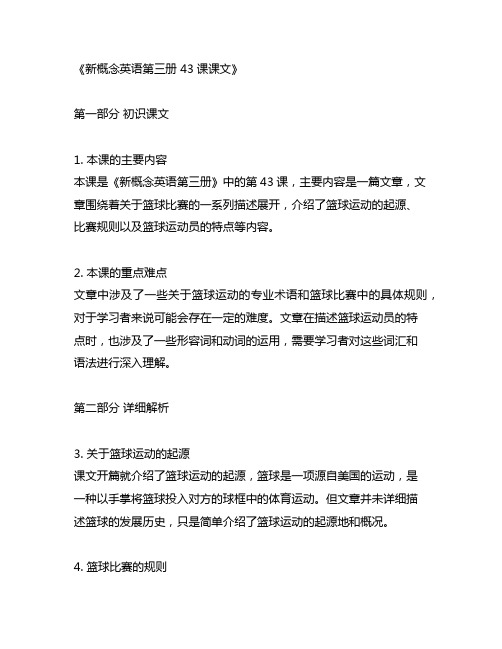
《新概念英语第三册 43课课文》第一部分初识课文1. 本课的主要内容本课是《新概念英语第三册》中的第43课,主要内容是一篇文章,文章围绕着关于篮球比赛的一系列描述展开,介绍了篮球运动的起源、比赛规则以及篮球运动员的特点等内容。
2. 本课的重点难点文章中涉及了一些关于篮球运动的专业术语和篮球比赛中的具体规则,对于学习者来说可能会存在一定的难度。
文章在描述篮球运动员的特点时,也涉及了一些形容词和动词的运用,需要学习者对这些词汇和语法进行深入理解。
第二部分详细解析3. 关于篮球运动的起源课文开篇就介绍了篮球运动的起源,篮球是一项源自美国的运动,是一种以手掌将篮球投入对方的球框中的体育运动。
但文章并未详细描述篮球的发展历史,只是简单介绍了篮球运动的起源地和概况。
4. 篮球比赛的规则文章中对篮球比赛的规则做了简要介绍,包括球员人数、比赛时间和得分规则等内容。
这部分内容比较直观,学习者可以通过阅读文中的描述来初步了解篮球比赛的基本规则。
5. 篮球运动员的特点在课文的后段,对篮球运动员的特点进行了具体描述,主要包括篮球运动员的身体素质和技术特点。
文中提到了篮球运动员需要具备较高的弹跳能力和速度,以及良好的协调性和射门技术。
对于学习者来说,这部分内容可能需要结合图片或视频等更直观的形式进行解释。
第三部分总结6. 对本课的意义和价值《新概念英语第三册 43课课文》作为一篇关于篮球运动的英语文章,具有丰富的专业词汇和相关知识。
通过学习这篇课文,不仅可以提高学习者的英语阅读能力,还可以增加对篮球运动的了解。
这篇课文也可以为学习者提供一定的背景知识,帮助他们更好地融入国际篮球文化,并拓宽视野。
7. 对于学习者的建议针对本课的学习,建议学习者可以通过多种形式进行学习,比如阅读课文内容、查阅相关的篮球运动资料、观看篮球比赛等。
通过多方位的学习,可以更好地理解和掌握本课的内容,并且对于巩固英语知识也有一定的帮助。
对于一些专业术语和篮球比赛规则等内容,建议学习者可以结合英语学习工具进行查阅和学习,以求更好的掌握相关知识。
新概念英语3知识点梳理 Lesson 43 Fully insured全保险

6. At the same time, a number of teenagers climbed on to the dish and held a little party of their own. Dancing proved to be more than the dish could bear, for during the party it capsized and sank in seven feet of water.
6
5. The pie committee decided that the best way to transport the dish would be by canal, so they insured it for the trip. Shortly after it was launched, the pie committee went to a local inn to celebrate. 馅饼委员会确认运输这只盘子的最佳方案是通过运河水运。于 是,他们对这只盘子的运输安全投了保。盘子下水后不久,馅 饼委员会成员们来到当地一家小酒店庆贺。
2
【例2】
Recently, the golf is announced to be a new _______ in the 2016 Olympic Games.
A. accident B. affair
C. event
D. incident
the+比较级,the+比较级 1. “the+比较级,the+比较级” 越…越… The more, the better. 多多益善。 2. “比较级+and+比较级 ” 越来越… He is becoming lazier and lazier. 他变得越来越懒了。
- 1、下载文档前请自行甄别文档内容的完整性,平台不提供额外的编辑、内容补充、找答案等附加服务。
- 2、"仅部分预览"的文档,不可在线预览部分如存在完整性等问题,可反馈申请退款(可完整预览的文档不适用该条件!)。
- 3、如文档侵犯您的权益,请联系客服反馈,我们会尽快为您处理(人工客服工作时间:9:00-18:30)。
Lesson 43 Fully Insured 全保险New words and expression 生词和短语Insure v.投保 =make a contract that promises to pay a sum of money in case of accident,damage,loss,etc. Insure sb/sth against sth给某人或某物保险,以防万一—Employer must insuer their employees against accident. Insurance n.保险 life insurance 人寿保险 property insurance 财产保险 Insurance company 保险公司同意词:assure v.向……保证,使确信((打消疑虑)保证,担保),它的宾语一定是人assure sb of sth be assured of 肯定 assure sb that eg. The Democrats are assured of success in the election.--I assur e you that I’ll bring your happiness. ensure: 保证,确保,宾语可以是物 --Hard work can ensure our success.guarantee:担保 --I can guarantee the watch for ten months.fete[feit] n. (usu. outdoor festival or entertainment, often one at which funds are raised, eg. for the church or a charity) 游园会(多在户外为某一目的筹钱)小猪佩奇,幼儿园的义卖eg. Our village is holding a fete to raise money for the repair of the church clock. 为修复教堂的大钟而筹钱。
festival n. 节日Spring Festival the Lantern Festival (元宵节)灯节gala ['ɡelə] n. 庆典,欢庆会,节日盛会; 演出(a public entertainment or performance to celebrate a special occasion)spring festival gala 春节联欢晚会carnival ['kɑːnɪv(ə)l] n. 狂欢节,嘉年华会基督教守斋期到来之前半周到一周的狂宴狂欢节,在此期间可以大吃大喝,寻欢作乐。
在美国,carnival也指流动的演艺团。
carnivore ['kɑrnɪvɔr] n. 食肉动物 carnivorous 食肉的;肉食性的premium ['priːmɪəm] n 1、保险费 2、附加费,额外的费用recover 1、vi.使得到补偿,弥补=make up for ,compensate for(多指金钱方面的)2、vt,康复 recover from3、收回,取回--Nothing can recover our health.同义词:regain: 经过努力而获得什么--regain one's courage 重新获得勇气recover our courage 恢复勇气--He regained/recovered his enthusiasm.restore 恢复(健康,原状)vt&vi --He has been restored. --He has recoverd.不及物heal vt.治愈(创伤,伤口) --His wound has healed. admittedly adv.公认地=we are admitting thataccepted truth 但是accepted常和truth等类型的词连用inevitably 不可避免地--Admittedly he is a great person.Purchase vt.买(比buy要正式,主要用于书面语,还可以是名词)The purchase of something is the act of buying it. 购买 [正式]A purchase is something that you buy. 购买的东西 [正式]purchaser N-COUNT 购买者--Can you purchase freedom with money?purchase money 买进价格 purchasing power购买力另:purchase还可以引申出to gain something but only by losing sth else以(失败损失)换取eg. a military victory purchased at great cost of life. 以极大的生命做代价换取了一个军事上的成功。
not worth a day’s purchase.危在旦夕 --His life is not worth a day’s purchase.barter ['bɑːtə] v. (to exchange goods, work ,or services for other goods or services rather than for money) 以物换物动词和名词两个词性barter sth for stheg. They bartered farm products for machinery.annual a.一年一度的an annual conference 年会 an annual income 年薪an annual revenue 年度税收an annual report 年度报告 an annual output 年产量 an annual reunion 年度聚会teenager n.(13至19岁)的青少年teen [tiːn] n. 青少年(等于teenager);adj. 十几岁的(等于teenaged)teenage adj. 青少年的;十几岁的 n. 青少年时期capsize [kæp'saɪz] V-T/V-I.(船)翻--The ship capsized because of the rough wave.upset v. 打翻(不小心)(upset, upset)eg. He upset a bottle of ink over the map.overturn v.翻overthrow v.打翻,推翻overthrow the government overthrow a decisionshiver v.打颤,发抖=tremble整体的颤抖用shiver, 部分的用tremble--His hands are trembling.--His trembling voice betrayed his secret.(注意这一句)--He is shivering with cold.shiver (to shake slightly because of being cold or frightened)shiver with cold 冻得发抖tremble v. (to shake slightly in a way that you cannot control, esp. when you are upset or frightened)震颤(有规律的、小幅度的抖动)发抖,颤抖,常含无法克制之意,有时也指物体轻微地颤动。
(非拟人,而是本意)shake v. 颤抖,颤动,哆嗦〔辨析〕普通用词,指人因激动、恐惧、寒冷等而全身或身体局部颤动,也指以任何形式颤动,含突然或不规则之意。
(shake的本意是摇,抖 vt&vi)Shiver [‘ʃɪvə(r)] v. 强调由于寒冷、惧怕而轻微和快速地抖动 -- I found he's shivering in a cold. shudder [‘ʃʌdə(r)] vi.强调全身的颤栗~ (with sth) | ~ (at sth)(因寒冷、害怕或激动)发抖,打颤,战栗-- The boy is shuddering, why? Because he was frightened.shudder 因为寒冷害怕等因素导致的全身抖动,可替换shiver dive (头向下)跳水1、v&n跳水 2、v&n潜水 3、v俯冲 4、v&n (股票、利润、数字等) 突然暴跌plunge v.投入,跳入[plʌndʒ](=jump or rush suddenly and wildly)以下都可以用plunge (sth) in/ into sth1、Vi (尤指向水中)纵身投入,一头进入;突然前冲(或下落)2、Vt 将…投入;将…插入;将…刺进3、[V] (of prices, temperatures, etc. 价格、温度等) 暴跌;骤降;突降4、(使)投身;(使)突然开始从事5、使(突然)陷入(不好的状态) the room was plunged into darkness--He got so angry that he plunge into the wate r.-- When the ship Titanic sank in the ocean, a large number of people plunged into...Haul v.拖曳=pull with effort our force强调用力拉(不涉及方向)--They hauled the boat up the beach.同义词:pull应用范围最广,连续不断的拉drag 拖拉,强调二者有摩擦力(作借喻时可指把人硬拉扯过来)--The stone was so heavy that I had to drag it into theroom.--After a day’s hard work,I dragged myself home.drag oneself to 拖着疲惫的身躯去tug 飞快地拖拉,强调幅度大,动作快(多指一阵阵地用力拖或拉,但不一定使被拉的人或物移动。
)--Look,a thief tug the bicycle.tow 借助外力拖拉较大较重的物体(比如拖车,拖船)(特指用绳子或链条等拖或拉本身无动力或无法使用自身动力的东西)--They towed the huge stone with a truck/lorry.draws to its close (near its end)拉向结尾,拖向结尾(指将人或物朝出力者的方向拖,不涉及力的大小,含平稳意味,常作借喻用。
